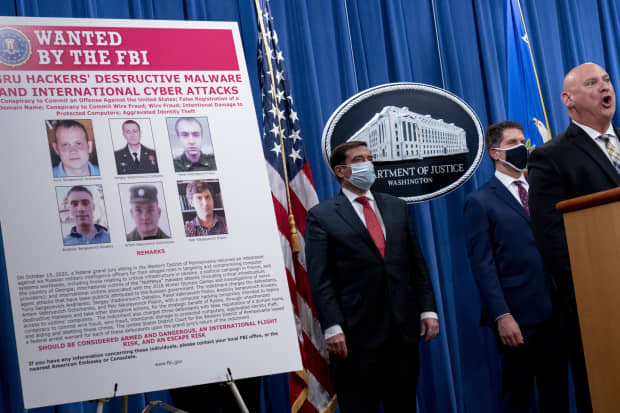This post was originally published on this site

A poster showing six wanted Russian military intelligence officers is displayed at a news conference at the Justice Department in Washington, D.C.
Getty Images
The U.S. Justice Department on Monday unsealed indictments against six Russian intelligence officers for alleged destructive cyberattacks against western interests from 2015 to 2019. The U.K. also accused Russia of having targeted the 2020 Tokyo Olympic and Paralympic Games after having similarly attacked the 2018 winter events in South Korea.
- U.S. prosecutors said the six individuals charged all work for Unit 74455 of the Russian intelligence Main Directorate, most commonly known by its acronym GRU. This is the same unit that was found to have leaked presidential candidate Hillary Clinton’s stolen emails during the 2016 campaign.
- The defendants are charged with several counts, including conspiracy, hacking, and wire fraud. Their 2017 attack on Ukraine, known as NotPetya, reverberated around the world for a global cost estimated at some $10 billion, paralyzing some big western companies such as Merck MRK, -0.40%, the pharmaceuticals group.
- The attacks by the unit known by specialists as Sandworm also notably targeted the election campaign of French president-to-be Emmanuel Macron in 2017.
- The six individuals from Monday’s indictment were placed on the Federal Bureau of Investigations’ “most wanted” list.
- After the U.K.’s National Cyber Security Centre revealed the attacks against the Tokyo games, Foreign Secretary Dominic Raab condemned Russia as “cynical and reckless,” and said the U.K. would continue to work with allies to “call out and counter future malicious attacks.”
- The Russian embassy in Washington said on Monday in a release that “such news breaks have no bearing on reality and are aimed at whipping up Russophobic sentiments.”
Read: ‘Russian influence in the U.K. is the new normal,’ according to a powerful report by lawmakers
The outlook: The six Russian operatives are unlikely to ever be extradited by their government, but their travels abroad will now be curtailed. All that Western governments can do, besides ramping up their cyber defense efforts, is try from time to time to draw red lines in the hope that Moscow will take note.
The new charges, revealed two weeks before the U.S. presidential election on Nov. 3, don’t address the allegations that Russia is also trying to influence its outcome this year, as assessed by the Central Intelligence Agency and other intelligence agencies. They show, at the very least, that western counterintelligence has become more aware of the Russian cyber danger in the last four years, and maybe better at countering it, presumably with tools and methods that are unlikely to be much publicized.
Read: Putin appears to hedge bets on U.S. presidential election in Russian state television interview

